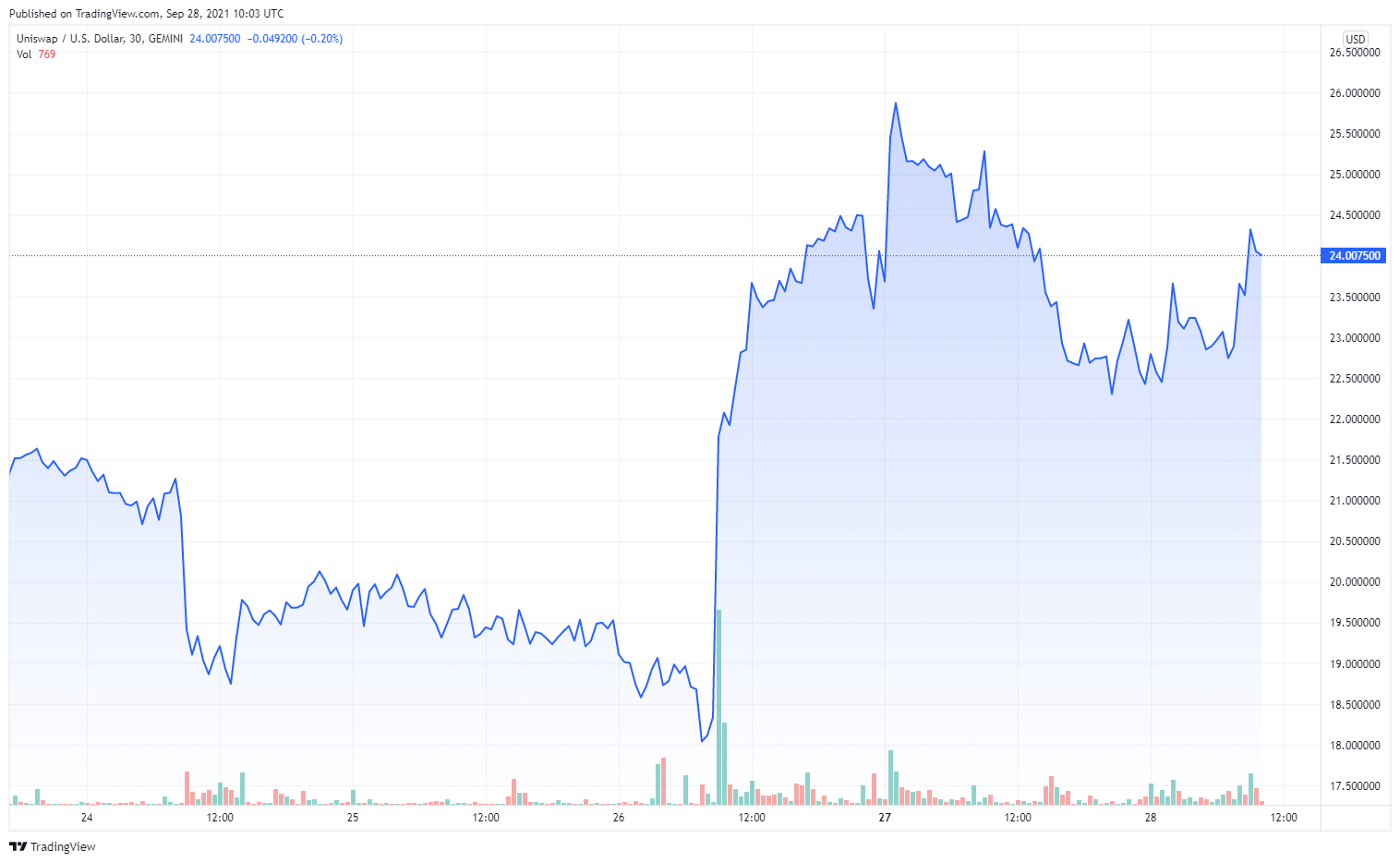Read in the Digest
- Institutional Investors Bought the China Dip, Uniswap Prices Spike after China’s Crypto Ban
- Coinbase and Revolut Roll Out New Crypto Services
- Facebook Invests in Building the Metaverse Responsibly
- Miami Mayor Pitches City’s Nuclear Facilities to Bitcoin Miners
- Netflix Announces Documentary on Crypto Entrepreneur’s Death
Institutional Investors Bought the China Dip, Uniswap Prices Spike After China
China has been at the core of the most significant market dips in 2021. The recent market dip resulted from the People’s Bank of China (PBoC) declaring cryptocurrencies and their services illegal in China.
The drop saw Bitcoin fall under $40k. However, institutional crypto investments have now seen 3 consecutive weeks of inflows on the back of 17 weeks of outflows. Between September 20 and September 24, the industry recorded $95 million worth of inflows.
While China’s purge caused a significant market decline, DEX (decentralized exchange) tokens received a major boost after the downtrend. The DEX sector recorded a combined profit of over 60%, while tokens of centralized exchanges grew by just 0.77% in 24 hours.
On Monday, September 27, Uniswap (UNI) gained as much as 14.90% to reach an intraday high of $26.26.

The five-day price chart of Uniswap (UNI): Source: Tradingview
Flipsider:
- After peaking at $26.26 on September 27, UNI has corrected and now trades at $24.007
Why You Should Care
Institutional investors are still interested, and the crypto market has shown resilience from China’s influence, recovering, stabilizing, and growing after each market dip.

Coinbase and Revolut Roll Out New Crypto Services
Premier crypto exchange Coinbase has built a reputation for offering some of the best crypto services. However, it is looking to expand its use into more traditional financial services.
Coinbase has announced that it will be launching direct deposit in the U.S., allowing people to deposit a portion of their paycheck directly into their Coinbase accounts. In addition, users can now spend USD directly from their Coinbase debit cards with no fees.
Revolut, a $33 billion fintech company, has plans in motion to launch its own cryptographic token. The token’s launch is subject to approval from the U.K.’s Financial Conduct Authority (FCA).
According to insider information, Revolut, which recently paid for a WeWork membership in crypto, will be looking to launch a way for Revolut users to earn tokens.
Flipsider:
Why You Should Care
The addition of crypto services affirms the increasing worldwide adoption of cryptocurrencies. However, the goal remains for the use of cryptos to become routine in everyday life.

Facebook Invests in Building the Metaverse Responsibly
Facebook’s foray into the crypto industry was marred by several regulatory roadblocks. The Libra project, which was announced in 2019, was delayed and inevitably rebranded as Diem tokens. However, there’s light at the end of the tunnel with reports stating that Diem’s launch is “only weeks away.”
With Diem on the way, Facebook, on Monday, September 27, announced that it will invest $50 million to partner with organizations to responsibly build the so-called metaverse. The metaverse is a digital world that allows people to use different devices to move and communicate in a virtual environment.
The metaverse is fondly referred to as the “next computing platform.” According to the Facebook press release, “the metaverse won’t be built overnight by a single company. We’ll collaborate with policymakers, experts and industry partners to bring this to life.”
Flipsider:
- While $50 million is a lot of money, Facebook has invested more in augmented/virtual reality (AR/VR) like the $3 billion acquisition of Oculus in 2014
Why You Should Care
With the idea of the metaverse gaining popularity, Facebook’s $50 million investment over the next two years will bring more attention and development to the technology.

Miami Mayor Pitches Bitcoin Miners to City’s Nuclear Facilities
The Mayor of Miami, Francis Suarez, has continued his push to make Miami a Bitcoin mining hub. In his latest move, Mayor Suarez has advocated for Bitcoin miners to have access to the city’s nuclear plants.
With rising concerns about the environmental impact of Bitcoin mining, Mayor Suarez believes that nuclear power is a better alternative. In addition, he stated, “the fact that we have nuclear power means that it’s very inexpensive power.”
Suarez said that a Miami-based nuclear plant owned by Florida Power & Light has been in talks with Bitcoin miners over how to get ahold of cheap land near the facility to host mining rigs.
The Mayor of Miami has taken a crypto-friendly approach since his election in 2017. In June, Suarez announced that workers in the city would be able to receive their salaries in Bitcoin. Then, in August, the city launched the first-ever city coin, MiamiCoin.
Flipsider:
- China has moved for a blanket ban on cryptocurrencies, restricting trading of digital assets, order matching, token issuance, and derivatives
Why You Should Care
As China intensifies its crackdown on cryptocurrencies, other countries are taking the initiative to become new mining hubs.

Netflix Announces Documentary on Death of Crypto Entrepreneur
Netflix has announced that it is making a documentary about the QuadrigaCX Bitcoin saga. The documentary Trust No One: The Hunt For The Crypto King will debut in 2022.
The documentary centers around a group of cryptocurrency investors turned amateur detectives who attempted to unravel the situation surrounding the mysterious death of crypto exchange founder Gerald Cotten and what happened to the $250 million they think he stole from them.
Gerald Cotten, the founder of QuadrigaCX, died in December 2018 of Crohn’s disease complications. And according to his widow, Jennifer Robertson, he was the only one with access to QuadrigaCX’s offline crypto storage, leading to the loss of the funds.
However, people had other ideas, claiming that Cotten faked his death because QuadrigaCX didn’t have enough cash to pay its creditors. Its eventual collapse liquidated more than 76,000 investors from Canada and worldwide of at least $169 million (CAD 213 million).
Flipsider:
- Before its collapse in 2019, QuadrigaCX was believed to be Canada’s largest cryptocurrency exchange.
Why You Should Care
The QuadrigaCX Bitcoin saga taught many investors one major lesson, “leaving money on an exchange – any exchange – is not always a good idea.”
Market News, Coinbase and Revolut Roll Out New Services, Facebook Invests in Metaverse, Institutional Investors Bought China Dip, Miami Mayor Pitches Nuclear Facilities to Bitcoin Miners, Netflix Announces Documentary on Crypto Entrepreneur’s DeathRead More



